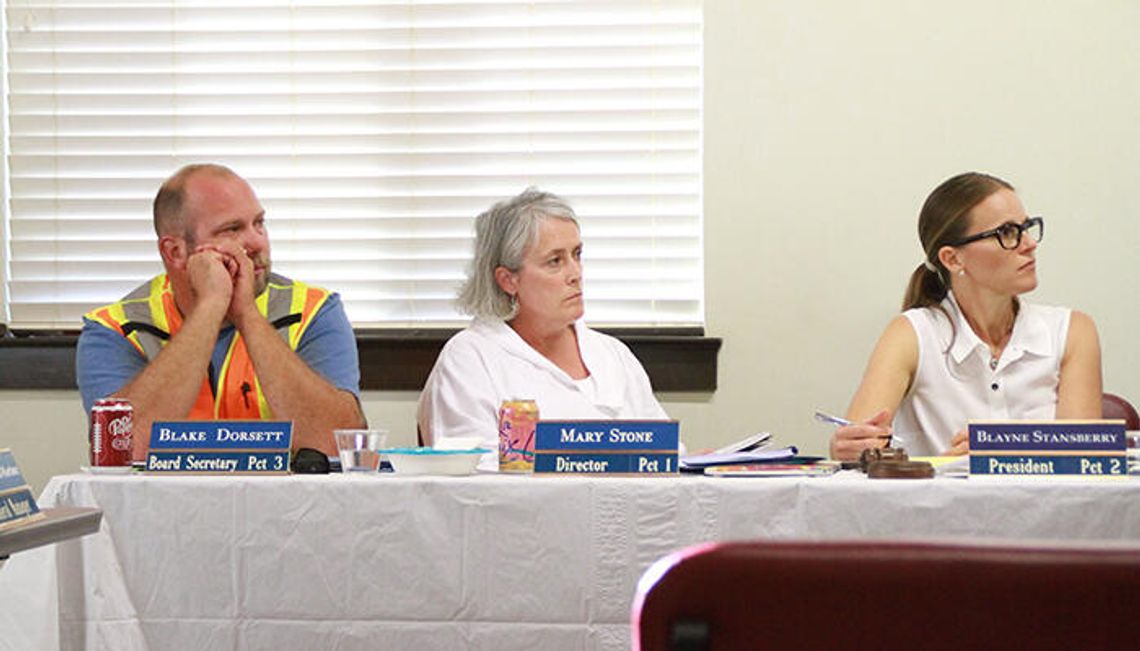Further discussion on a Houston-based firm’s request for nearly one billion gallons of Middle Trinity aquifer groundwater is heading into the court system.
On July 12, the Barton Springs Edwards Aquifer Conservation District (BSEACD) board of directors unanimously approved for the State Office of Administrative Hearings (SOAH) to hold a contested case hearing for Electro Purification’s water permit request.
EP seeks to pump 912.5 million gallons of water from its test wells in western Hays County for wholesale water consumption. Ed McCarthy, an attorney representing EP, said the firm’s sole contract is with the Goforth Special Utility District. McCarthy said Goforth “would like more water than we have available.”
Bill Dugat, legal counsel for BSEACD, said EP filed a July 5 request to have the permit referred to the SOAH, which will offer a recommendation to BSEACD for judgement. Dugat said the district has the ultimate say on the permit, and can choose to follow or modify SOAH’s recommendation.
A date and time for the hearing has not been set. Dugat said the district will work with EP and SOAH to solidify a contract for the hearing and determine cost estimates. EP will pay for the contested hearing costs.
Dugat estimated SOAH could hold a hearing six to eight weeks after a contract is finalized. McCarthy said the firm expected a contested case hearing and sought for the case to be referred to SOAH.
Twelve requests for a contested case hearing were submitted to the BSEACD, Dugat said. The requests were submitted after EP placed a June 5 and June 26 public notice in local publications seeking public input for its permit. That includes a contested hearing request submitted in June by Hays County Pct. 3 Commissioner Lon Shell. On July 10, Hays County Commissioners approved a resolution ratifying support for Shell’s letter for a hearing on the permit.
Just over 300 comments regarding the permit were also submitted to BSEACD officials.
“It wouldn’t surprise me to hear of a hearing in September,” Dugat said. “There will not be any foot dragging.”
Prior to a decision, area residents spent close to an hour relaying concerns, and at times frustrations, to BSEACD leaders of possible impacts EP’s permit could have.
Wimberley resident Patrick Cox, who also represented the Our Water Rights Alliance, said the group has collected over 3,200 signatures and counting protesting EP’s proposed permit.
Cox said BSEACD’s draft permit has insufficient data and that more study and analysis is needed, primarily on the impact it could have on the Trinity Aquifer. Cox said the permit “threatens our water quality and quantity” and that it was “impossible” for the EP’s permit to harmonize with the BSEACD’s board mission of conservation.
Cox said EP must justify the need for “this unprecedented volume of water they want to mine and ship out of the area.”
“I think we’ve all demonstrated tonight, scientifically, through historic usage, and just the ethics, this permit request is way beyond anything that is rational or should be accepted,” Cox said.
Ashley Waymouth, a representative with the Wimberley Valley Watershed Association, estimated EP’s request for 2.5 million gallons of water per day would fill almost four Olympic-sized swimming pools.
Waymouth said the WVWA is concerned that EP’s permit could impact natural features such as Jacob’s Well and Blue Hole for future generations.
Joe Day, a Wimberley resident who lives near EP’s test wells, said for the “first time in history,” a company is looking to obtain water with no land ownership or certificate of convenience and necessity (CCN) required for a public water supply.
Day also felt the permit process is incomplete, and believed the district should have a longer-term model for possible drawdown of nearby wells. Day said EP’s permit should be tied to the land and follow existing groundwater models.
Concern over EP’s permit is “nothing new that we haven’t heard before,” McCarthy said.
McCarthy said EP is “sorry people are afraid” and that EP has done “a lot of science and invested a lot.” EP has done two pump tests on the property, with its hydrogeologists conducting pump tests on other properties, McCarthy said.
“Based upon the science we have available, we are very confident there will not be a problem,” McCarthy said.
EP is also planning to work with BSEACD on its recommendation to phase pumping levels, per the district’s draft permit.
“We don’t think, one, there will be a problem long-term with production, and to the extent if we’re wrong, we’ll see it early and see it at a time when the district can control and regulate it,” McCarthy said. “The district is doing it’s job, we think. We don’t think there is going to be a problem.”











